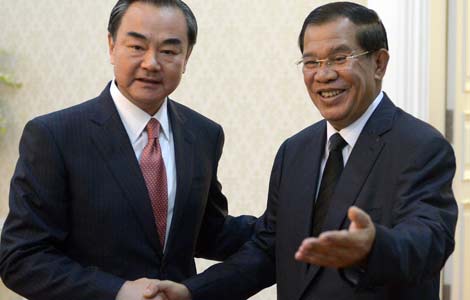Chinese netizens debate upping retirement age
Updated: 2013-08-22 20:58
(Xinhua)
|
||||||||
BEIJING - Proposals to lift pension ages in order to ease China's financial burden have renewed public debate over changes to the retirement age.
A new scheme proposed by China's Tsinghua University suggested raising the pension age for both men and women to 65 as of 2030, up from the current 60 for men and 50 for women in general.
The proposed age is based on the pace of aging in China, said Yang Yansui, director of the Tsinghua Center for Employment and Social Security, adding that raising the pension age does not imply an adjustment to the retirement age.
However, Tang Jun, secretary-general of the social policy research center of the Chinese Academy of Social Sciences, wrote an essay on Tuesday arguing most people cannot work until 65, adding that employment opportunities for younger workers would be affected.
"It will trigger resentment among the older workers and anger from the youth when they cannot find jobs," Tang wrote.
China has been considering raising retirement age since 2008 to cope with its shrinking workforce and aging society, which place a growing burden on the country's pension system.
Both the Tsinghua scheme and Tang's essay stirred debate online, with few in favor of the increase.
"What can we rely on to sustain daily life during the break if we retire at 50 but receive pension 15 years later?" wrote microblogger Song Chi.
Song's confusion and anger were echoed by many users on Sina Weibo, China's Twitter-like microblogging service.
"If implemented, subways and buses will be crowded with gray-haired people in the future. They dream of early retirement. So do the jobless twentysomethings strolling in parks who are yearning for employment opportunities," said Xiaoyu Shasha on Sina Weibo.
A more progressive and flexible retirement mechanism that would respect workers' plans for early or late retirement may better address the issue, Kaifeng Zinan wrote on China's popular BBS Tianya community.
"Far from the people-oriented principle, delaying retirement regardless of public sentiment is still GDP-oriented thinking," said Chen Zuoliang, another microblogger.
Meanwhile, many urged reform of the much-criticized dual pension mechanism, which solicits endowment insurance from non-government workers while excusing government staff from the fees.
"It is difficult to expect a fair and well-recognized retirement and pension proposal unless the pension system is reformed, as the delay may benefit some people at the expense of others," wrote a microblogger named Urban Nomads.

 Manning gets 35 years in WikiLeaks trial
Manning gets 35 years in WikiLeaks trial
 At least 37 killed in Malaysian bus crash
At least 37 killed in Malaysian bus crash
 FM calls for closer Cambodia relations
FM calls for closer Cambodia relations Problems for rural kids in cities
Problems for rural kids in cities
 Search for escaped crocodiles continues
Search for escaped crocodiles continues
 Police break up baby trafficking ring
Police break up baby trafficking ring
 Jeremy Lin celebrates birthday in basketball clinic
Jeremy Lin celebrates birthday in basketball clinic
 Police identify suspect in US school shooting
Police identify suspect in US school shooting
Most Viewed
Editor's Picks

|

|

|

|

|

|
Today's Top News
Could Fed's QE-3 tapering come as soon as Sept?
Bo Xilai stands trial for bribery, embezzlement
Export rebound in US 'no big threat'
China will become No 1 oil importer
Affluent tourists 'go it alone'; seek culture, good food
Sales of iPad fall as Android-based devices gain
Manning gets 35 years in WikiLeaks trial
Illegal Chinese workers detained in Russia
US Weekly

|

|







